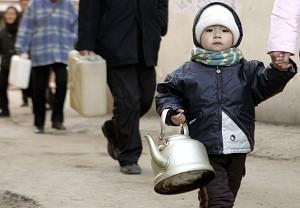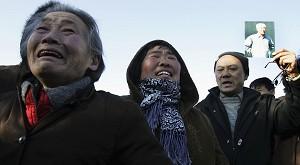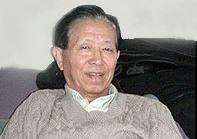BEIJING - China's northeastern city of Harbin turned on the taps again on Sunday after a toxic spill into its river left millions without water for five days and an 80-km (50-mile) slick still flowing beyond the city.
Water supplies in Harbin, capital of Heilongjiang province, were resumed at 10:00 a.m. GMT and provincial Governor Zhang Zuoji drank tap water to prove it was safe, state media said.
Hospitals, schools, homes and party and government institutions will be given priority access to water, but bath houses and car washes will remain closed, state television said.
Tests by environmental protection officials at 6:00 a.m. showed the level of nitro-benzene in the water at 0.0034 milligrams per liter, meeting national standards, the local government Web site said. No traces of benzene were found.
The water was 30 times above official safety limits two days ago. Water was discharged from nearby reservoirs to dilute the toxic spill and 1,000 soldiers raced to ensure water would be drinkable by installing charcoal filters at water plants.
An explosion at a chemical plant in nearby Jilin province about two weeks ago poured an estimated 100 tonnes of cancer-causing benzene compounds into the Songhua river from which the city of nine million pumps its water.
The Harbin crisis has raised wider questions about the costs of China's breakneck economic boom. Around 70 percent of its rivers are contaminated, and the cabinet recently described the country's environmental situation as grim.
“Environmental problems in China are not something far away, but are threatening our daily life,” Pan Yue, vice minister of environmental protection, told the official Xinhua news agency.
In Lengshuijiang city in the southern province of Hunan, water supplies were suspended for 12 hours on Friday after fertilizer maker Jinxin Chemical Co. accidentally spilled more than 100 cubic meters of ammonia nitrate into the Zijiang river, the Beijing Youth Daily said on Sunday.
The city, which has a population of 100,000, resumed water supplies after tests showed pollutants in the water did not exceed acceptable levels, the newspaper said, adding that the spill would not have any impact on cities downstream.
THOUSANDS STILL AT RISK
Environmentalists have complained China is not sharing enough information about the Harbin spill to protect Russia's rivers and residents, including 1.5 million people in the Siberian city of Khabarovsk, which draws water from the Amur River, fed by the Songhua.
Chinese Foreign Minister Li Zhaoxing on Saturday expressed regret to Russia's ambassador over the incident and briefed him on the situation.
The river slick had passed Harbin by early Sunday morning, the Heilongjiang provincial Environmental Protection Bureau said.
But it could still affect hundreds of thousands more people in China alone as it heads downstream.
The Jilin chemical plant's parent, China National Petroleum Corp., has apologized for the pollution in the Songhua river.
But one newspaper accused Jilin of trying to hush up the disaster, and even Xinhua called on officials to be more frank.
Premier Wen Jiabao visited Harbin on Saturday and pledged openness about the incident on behalf of a communist leadership often accused at home and abroad of covering up the truth of disasters, disease outbreaks and social problems.
He also urged university students to stay calm and stopped at a supermarket to check the prices of bottled water. Store shelves were cleared of bottled water by panicking residents last week but calm has returned to the city.
Two residents have lodged court claims for damages in Harbin courts, a rare step in China.



